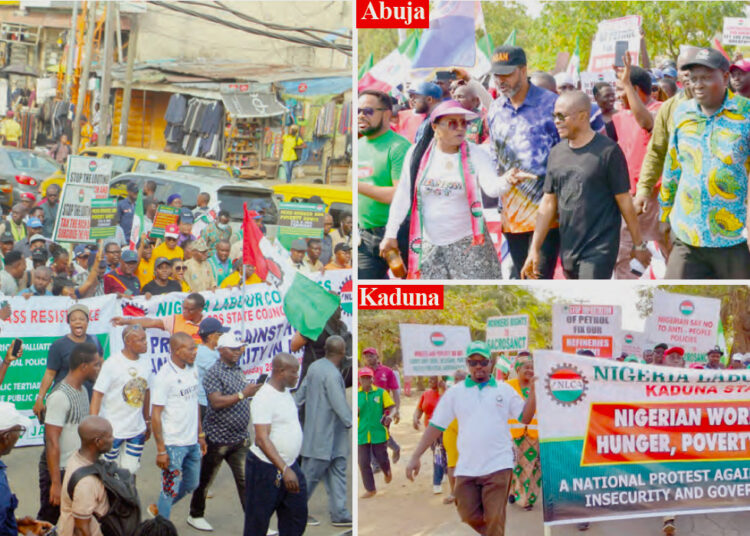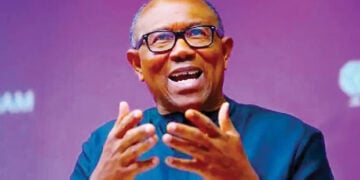Nigerian workers under the aegis of the Nigeria Labour Congress (NLC) yesterday grounded activities across the states of the federation to protest the hardship being faced by most Nigerians.
They abandoned their work places and trooped out in their hundreds across the state capitals to draw the attention of the federal and state governments to their worsening plight under the economic reforms embarked upon by President Bola Ahmed Tinubu and the state governors.
The president of the Nigeria Labour Congress (NLC), Comrade Joe Ajaero, who led thousands of the workers in the Abuja protest, said the living conditions of workers have deteriorated and workers can no longer eat ordinary food items such as the popular spicy Indomie meal.
Later yesterday, the leadership of the NLC suspended the street protest scheduled to continue today.
The decision was reached after the National Executive Council (NEC) of NLC held an emergency meeting in Abuja yesterday evening.In a communique issued at the end of the meeting, NEC said it had reviewed the outcome of the first day of the nationwide protest against “massive suffering and hunger facing the masses and workers” due to the government’s policies of increasing the price of Premium Motor Spirit (PMS) and floating the Naira.
NLC President Joe Ajaero and the acting general-secretary, Comrade Ismail Bello, who signed the communique, said that the NEC-in-session was satisfied with the massive turnout and peaceful conduct of Nigerians, NLC affiliates, state councils, workers and civil society allies across the nation, who demonstrated their outrage over the hardship and suffering.
The NEC-in-session also commended Nigerian workers and masses for sending a strong message to the authorities about their united resolve to demand accountability and justice from those who occupy positions of leadership in the nation, and it believes that the message has been passed.
The communique reads in parts: “In view of the overwhelming success and impact of the first day of the protest, the NEC-in-session resolved to suspend street action for the second day of the protest, having achieved the key objectives of the two-day protest on the first day”.
Ajaero, however, stated that the nationwide action continues today with simultaneous press conferences across all the states of the federation by the state councils of the congress, including the national headquarters.
Meanwhile, the NLC has extended the seven-day ultimatum by another seven days, which now expires on March 13, 2024, within which the government is expected to implement all the earlier agreements of October 2, 2023, and other demands presented during yesterday’s protest.
According to the communique, NEC will meet and decide on further lines of action if, on the expiration of the 14-day ultimatum, the government refuses to comply with the demands as contained in the ultimatum.
Yesterday’s protest came despite earlier warnings to the NLC from the Department of State Services (DSS) to shelve the planned protest over security concerns.
However, in Abuja, thousands of Nigerian workers defied the threat, came out en masse in a show of solidarity against the current pervasive hunger amidst heavy security presence.
Addressing the protesters at the Pascal Bafyau Labour House in Abuja, Ajaero explained that the protest was not about the demand for a million naira new minimum wage, which he described as even inadequate to meet the basic needs of the average Nigerian worker and their dependents, but about the excruciating hunger in the country.
The labour leader cited the United Nations’ recommendation that the poorest man should be fed on $2 per day, which translates to about N700,000 per month for a family of six, as a benchmark for a living wage.
Ajaero also lamented that the implementation of the current minimum wage was still a mirage in some states and sectors, and that the NLC was yet to conduct a proper analysis of the cost of living across the geopolitical zones.
He further criticised the periodic review of the minimum wage every five years, saying that it was eroded by inflation and devaluation of the naira.
According to him, the NLC had some other ideas on how to go about the minimum wage, and that it was demanding N1 million as the new minimum wage considering the rapid depreciation of the naira.
He warned that the economy was in a dire state, and that the workers could not afford to buy basic goods with a bagful of money, adding that after the protest, the NLC would review the situation and decide on other steps to be taken to press home its demands.
Ajaero said, “This protest is not about minimum wage, you have to understand it. This protest is about hunger. What of those that are not working? The minimum wage, when will it be completed to be the minimum wage that will remove hunger?
”The rally is also to make Mr President know how Nigerians feel. We know where it is pinching us, we are also out to protest and to register before Nigerians the level of suffering and that there is hunger in the land.
“We want to call on the federal government to immediately address the issue of hunger in the country. There is nobody that does not know that a bag of rice is over N70, 000 or more; we cannot buy Indomie, and bread is out of reach, and with N30, 000minimum wage if you eat a loaf of bread every day, you will be spending over N40,000.”
After receiving the letter of demand from the NLC, the chairman, Senate Committee on Employment, Labour and Productivity, Diket Plang, lauded the workers for their peaceful protest.
He assured them that the National Assembly would expedite the passage of the minimum wage bill and address their demands.
Kaduna
In Kaduna, the peaceful protest started from the State Secretariat of the NLC located opposite the National Ear Care Centre through the Independence Way to Luggard roundabout and back to the Secretariat.
It was led by the state chairman, Comrade Suleiman Ayuba, and the president of the National Union of Textile, Garment and Tailoring Workers of Nigeria (NUTGTWN), Comrade John Adaji, with members carrying placards with inscriptions such as ” end hunger”, ” Minimum wage cannot buy bag of rice”, ” end insecurity, ” among others.
The protest which was peaceful had security cover to avoid it being hijacked by hoodlums, and there were security personnel at strategic roundabouts.
Speaking to newsmen, the Kaduna chapter NLC chairman said the situation in the country was becoming unbearable and if nothing is done it might get worse, hence the need to speak the language the government understands, which is peaceful protest
Niger
In Niger State, NLC affiliate Unions participated in the nationwide protest.
The protesters led by the NLC chairman, Comrade Idris Abdulkareem Lafene, started from Labour House along General Ibrahim Badamasi Babangida road and went through major streets in Minna, to the State House of Assembly
They carried placards with various inscriptions to show that the workers were hungry and against harsh policies of the government.
Lafene, in his presentation, advised Governor Mohammed Umar Bago to stop the introduction of food price control, saying that it would impoverish farmers who bought farm inputs at high prices.
Osun
Residents of Osogbo led by the NLC leadership in Osun and Civil Society Groups trooped out in their numbers to protest the hardship bedeviling the country.
The protesters who converged on the Nelson Mandela Freedom Park to commence the protest at about 8am comprised members of organised labour that included the NLC, human rights groups such as Joint Action Front (JAF), Coalition for Revolution (CORE), Osun Civil Societies Coalition (OCSC), Coalition for Revolution, Joint Action Force, and Committee for Defense of Human Rights (CDHR) amongst others
They were armed with banners, placards and leaflets with different inscriptions that read: “We say no to hardships”, “We say no to hunger”, ” We are fed up with starvation, “Let the poor breathe’; ‘Stop stealing palliatives meant for the working poor’, “End Insecurity’, ‘We reject devaluation of Naira’, ‘No to anti-people policies,’ among others.
The protesters in carnival form processed through major streets in Osogbo, the state capital.
The state NLC chairman, Christopher Arapasopo, urged the federal government to find solutions to the issue of high cost of living in the country.
Ekiti
Also, workers in Ekiti State joined their counterparts to stage a peaceful protest against high cost of living and economic hardship in the country.
The protest led by the chairman of NLC in the state, Comrade Kolapo Olatunde, had members of other affiliate academic and medical unions including ASUU, ASUP, NASU, NULGE, NUT, SSANIP, AUPCTRE, SSANU, MHWUN and others in attendance.
Addressing the workers, who massed at the popular Fajuyi area of Ado Ekiti, the state capital as early as 8am, Olatunde lamented that prices of goods and services had continued to increase after fuel subsidy was withdrawn last May.
Abia
On his part, Abia State chairman of NLC, Comrade Okoro Ogbonnaya said the protest was 98 percent successful.
He said the protesters took off from the chapter’s secretariat along Aba Road in the capital and ended at Government House, Umuahia, where they delivered their letter of protest to the governor.
Ogun
The Ogun State chapter of NLC staged a peaceful protest in major streets of Abeokuta metropolis, the state capital, to protest the rising cost of living in the country.
Armed with big banners and posters bearing different inscriptions, the protesters converged at the NLC’s State Secretariat located along the Abiola Way from where the protesting train proceeded to the town.
The protest was earlier scheduled to commence around 7: 30am, but it could not commence due to the initial low turnout of members, until about 11am when a sizable number assembled.
Except for the leadership of the Trade Union Congress (TUC) in the state, LEADERSHIP observed that leadership of all the 40 other affiliates of the labour movement in Ogun State were on ground and participated in the peaceful rally.
Rivers
A former president of the National Union of Petroleum and Natural Gas Workers (NUPENG), Comrade Igwe Achese, has declared that the NLC will continue to be the voice of Nigerians.
Achese made the declaration yesterday in Port Harcourt while addressing workers at the commencement of the two-day national protest march organised by NLC.
He said, “The only voice of the common man, the voice of the citizens and the voice of the people is the NLC. Without the labour movement, I doubt if this country will even see democracy. We fought for this democracy and our leaders sacrificed their lives for democracy to come to stay.”
Plateau
Commercial activities were grounded in Jos, the Plateau State capital, as the NLC Plateau State chapter joined their counterparts in a nationwide protest over the economic hardship in the country.
Most of the commercial banks in Jos/Bukuru metropolis were partially closed. As early as 9am workers had converged under the overhead bridge, Secretariat junction singing solidarity songs.
The chairman of NLC, Plateau State chapter. Comrade Eugene Manji , while addressing the workers, called on President Bola Tinubu-led federal government to handle the situation with care before it escalates to an unmanageable stage.
Kwara
Workers in Ilorin, Kwara State, also staged a peaceful protest on major roads to register their displeasure over the high cost of living in the country.
Led by the state chairman of the NLC, Comrade Olayinka Murtala, the workers took off from the Labour House, Lajorin road, GRA, Ilorin and moved across Ahmadu Bello Way before landing at the Governor’s Office, Ilorin, where they were received by the permanent secretary, Establishment, Pensions and Industrial Relation, Ibrahim Mohammed.
Though the protest was peaceful, there was heavy presence of security men at strategic locations in the Ilorin metropolis.
Governor Makinde, Falana Join Protest In Oyo, Lagos
Oyo State Governor Seyi Makinde has assured protesting workers that the current economic hardship will soon be over.
The governor joined the protesters at Total Garden, along Secretariat road, Agodi, Ibadan,in order to ensure that the protest did not degenerate into anarchy.
The governor while addressing the protesters called for calm, stating that he also felt the heat of the hardship as he joined labour protesters in the state in raising the alarm about the deteriorating economic situation in the country.
The governor said hardship and poverty had reached alarming levels, with many unable to feed themselves or find work.
Also senior lawyer, Mr Femi Falana (SAN) joined the protest in Lagos, saying there was urgent need for a social security bill to address economic hardship in the country.
Falana said the provision of palliatives by the government is not enough to address the current economic challenges facing Nigerians, urging the government to place priority on social security law and youth employment.
He said, “We want a bill for social security in the state, and if Lagos can start, other states will be compelled to follow suit.
“It is no longer enough to give palliatives; it must be permanent and that is why a social security bill must be passed by the House in the interest of our people,” he said.
Lawmakers Recommend Food Stamps To Ease Ordeal
Meanwhile, the Senate has advocated the introduction of food stamps in Nigeria as an interim measure to address food insecurity in the country as a way out of the hardship.
She urged the executive to act fast.
The Senate decision followed a motion, sponsored by the Senate Chief Whip, Ali Ndume (Borno South) and co-sponsored by Sen. Saliu, Mustapha (Kwara Central), had several other Senators asking for their names to be added as co-sponsors.
Food stamps are a supplemental nutrition assistance programme which provides food-purchasing assistance for low-and no-income people to help them maintain adequate nutrition and health.
Ndume, while reading his motion during plenary, said at the unveiling of the October 2023 Cadre Harmonised Analysis on food insecurity, it was projected that in 2024 Nigeria is expected to see about 26.5 million people grappling with high levels of food insecurity.
Accordingly, the Senate urged the federal government to introduce the Nigerian version of the food stamps programme as an interventionist measure to cushion the effects of food insecurity in the country.
We’ve got the edge. Get real-time reports, breaking scoops, and exclusive angles delivered straight to your phone. Don’t settle for stale news. Join LEADERSHIP NEWS on WhatsApp for 24/7 updates →
Join Our WhatsApp Channel










